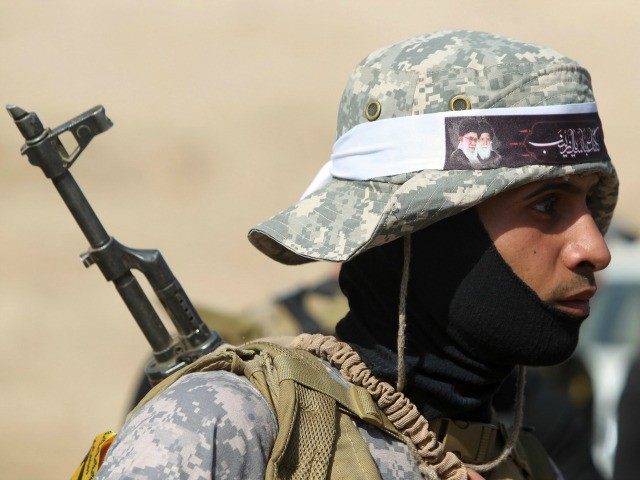At a press conference in Stockholm on Wednesday, Iranian Foreign Minister Mohammad Javad Zarif testily informed an “arrogant” Saudi Arabia that Iran will not be pulling out of Iraq any time soon, and he blamed the Saudis for inflaming the Sunni-Shiite tensions they have blamed on Iran’s presence.
“We will leave Iraq whenever Iraq asks us to. And we will help Iraq to confront terrorism, as long as Iraq wants us to,” Zarif declared, as reported by the Times of India.
Over the weekend, the Saudis called on Iran to “stop intervening” in the affairs of neighboring countries, especially Iraq, where the Saudis said Iran was sowing “sedition and division” with its Shiite militias.
Zarif said that was “an absurd statement” and that “nobody should arrogate themselves to talk on behalf of other countries.”
He went even further and obliquely accused the Saudis of using extremist groups like the Islamic State and al-Qaeda -– both of which practice forms of Sunni Islam -– as “leverages for political gain.”
“That’s the worst miscalculation anybody has made in our region,” said Zarif. “I believe the sooner Saudi Arabia comes to understand that ISIS is first and foremost a threat against them, then, anybody else, the sooner we are able to confront this total menace for all of us, not only in the region but in the world.”
It is not just the Saudis expressing concerns about the heavy Iranian footprint in Iraq. Business Insider noted on Thursday that the presence of top Iranian saboteur and terrorism coordinator Qassem Soleimani of the Quds Force on the battlefields of Fallujah and Mosul has “has unnerved those familiar with Iran’s campaign to cultivate influence in the region through Shiite proxy militias.”
“I can’t emphasize enough how alarmed I am over these photos of Soleimani. Iran has a formal campaign of cultivating Shiite proxies, and those proxies have now been put on the Iraqi government’s payroll in the form of the PMU,” said Ali Khedery, the longest continuously serving U.S. official in Iraq.
“PMU” is an abbreviation for “Popular Mobilization Units,” which is basically Baghdad’s preferred euphemism for Iran’s Shiite militia fighters. The deputy chair of the PMU, Abu Mahdi al-Muhandis, has been designated a terrorist by the government of the United States, as have many of the militia leaders Soleimani is working with, and Soleimani himself has “American blood on his hands,” in the words of Sen. John Cornyn (R-TX).
Business Insider reports that “Iraqi officials deny that the PMU is supported by Iran, but Soleimani’s presence in Iraq suggests that Tehran is likely playing a significant military role there — and that the US is letting it happen.”
Khedery explained to Business Insider that fighting Sunni extremists with Shiite extremists is a very bad idea, as the U.S. should have learned from the successful Iraq surge of 2007, which was largely about replacing Iran’s malevolent influence with U.S. guidance. A weak Obama administration, desperate for a win against the Islamic State, is not so picky about its allies, however. Obama’s major political objective is to minimize the number of American “boots on the ground.” In fact, he has been misleading the American people for years about how many boots actually are in harm’s way on Iraqi soil. His Fallujah strategy is basically the 2007 surge in reverse.
“The Obama administration is willing to provide Soleimani [and his proxies] with virtually unending support for the sake of the anti-ISIS campaign,” Khedery told Business Insider. “We will thus win the battle, but we will certainly lose the war. The US is unwittingly priming the Middle East for endless sectarian war, and that will certainly haunt the world for decades to come.”
Former U.N. Ambassador John Bolton made a similar point Thursday on Breitbart News Daily.
“It’s a tragedy, and it’s largely due to Obama’s 2011 decision to withdraw American forces,” said Bolton. “That gave Iran the ability essentially to co-opt the Baghdad government, that split — in my view, finally and for all — the Kurds and the Sunni Muslims off from the government of Iraq, and turned it into a Shia satellite of the ayatollahs in Tehran.”
“This fighting now, we’re assisting the Ayatollahs and the Shia militia, fighting against many Sunnis who were with us in the Anbar uprising, the Anbar Awakening,” he said. “It’s just tragic for the United States.”
Business Insider cites some other experts who hope the Iraqi government can keep Shiite militias on the outskirts of Fallujah and Mosul, as they claim their strategy dictates. However, there are still reports of Iran’s proxies attacking Sunni civilians on Iraqi ground captured from ISIS, including 17 civilians reportedly killed in a district on the very same “outskirts” of Fallujah where Baghdad has supposedly contained them.
Shiite militia leaders claim the Sunni civilians they’re targeting are ISIS sympathizers, and some Sunnis in the area think the Islamic State is their best hope of protection against Iran and its militia proxies.
There is no reason to feel good about a sleazy character like Qassem Soleimani taking charge of the Iraqi battlefield. The Saudis certainly have their shortcomings, but they’re right about what Iran has planned for Iraq, and they must be wondering why their nominal allies in the U.S. government are so comfortable teaming up with those who murdered American soldiers just a few years ago.

COMMENTS
Please let us know if you're having issues with commenting.